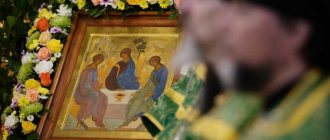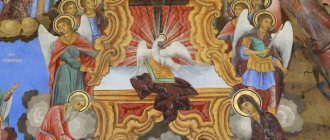Since man became intelligent, he began to look for answers to questions about who created everything that exists, about the meaning of his life, and whether he is alone in the Universe. Not finding an answer, the people of antiquity came up with gods, each of whom was in charge of his own part of existence. Someone was responsible for the creation of the Earth and Sky, someone was in charge of the seas, someone was in charge of the underworld.
As we learned about the world around us, there were more and more gods, but people never found an answer to the question about the meaning of life. Therefore, many old gods were replaced by one God the Father.
Concept of God
Before Christianity appeared, people lived for several thousand years with faith in the Creator, who created everything that surrounds them. This was not a single god, since the consciousness of ancient people could not accept that everything that exists is the creation of one creator. Therefore, in every civilization, regardless of when and on what continent it arose, there was God the Father, who had assistants - his children and grandchildren.
In those days, it was customary to humanize the gods, “rewarding” them with character traits characteristic of people. This made it easier to explain natural phenomena and events taking place in the world. A significant difference and clear advantage of the ancient pagan faith was that God manifests himself in the surrounding nature, and therefore was worshiped. At that time, man considered himself one of the many creations created by the gods. In many religions there was a principle of assigning the appearance of animals or birds to the earthly hypostases of gods.
For example, in Ancient Egypt, Anubis was depicted as a man with the head of a jackal, and Ra with the head of a falcon. In India, the gods were given images of animals living in this country, for example, Ganesha was depicted as an elephant. All religions of antiquity had one feature in common: regardless of the number of gods and the difference in their names, they were created by the Creator, who stands above all, who is the beginning of everything and has no end.
Universal form of the Supreme.
In “BHAGAVAD-GITA” (“Song of God”) , which describes the incarnation of the Supreme 5 thousand years ago, Krishna presented His universal form. The entire universe is the transformed energy of God (the Supreme). Therefore, this universal form of the Almighty, in its essence, represents the entire Universe, with everything that is happening, what has happened and what will happen in the future. This universal form could be seen by people who had reached a high level in spiritual development. Above we quoted an excerpt from the Gospel of Matthew :
5:8. “ Blessed are the pure in heart , for they God . ”
And also, the form of God can be seen by those people whom the Almighty Himself allowed to see this form.
This is how the universal form is described in BHAGAVAD-GITA :
("BHAGAVAD-GITA"; CHAPTER 11)
The Almighty has the quality of being the Supreme Almighty Being. Therefore, He can manifest Himself in any place, and in the form in which He considers it necessary and appropriate for a given situation, and at a given time. This article does not describe all the forms in which the Almighty has manifested and will manifest Himself. These forms of incarnations and manifestations are described in the Vedic scriptures, which are vast in scope. In order not to get confused, and to understand everything in the necessary sequence, you should begin familiarizing yourself with the Vedic scriptures with “BHAGAVAD-GITA” - as it is.” This work is presented with comments, and therefore is perceived as it should be. “BHAGAVAD-GITA” is recognized as the quintessence, the essence of all Vedic knowledge. And therefore it gives a general and correct understanding of the structure and cause of the entire universe as a whole. BHAGAVAD -GITA” presents all the main options and paths of human spiritual development.
……………………………………………..
Among one people, God manifests Himself as an unknown and invisible omnipotent force. By manifesting Himself in this way, God built His relationship with this people through fear (for deviation from His laws). Apparently this society was at this certain stage of understanding the relationship with the Almighty.
In the ancient Vedic civilization, God incarnated in an incomparably beautiful human form, so that the people of this civilization could build their relationship with God through love! Such relationships of mutual all-consuming rational love between a person and the Almighty (God) are the final, final stage of the spiritual development of a person and a developed human society.
A person may not believe in God. But the existence of the human soul is, in fact, a proven fact. I recommend reading Michael Newton's book JOURNEY OF THE SOUL. A professional hypnologist of the highest category documents the stories of his patients in his book. This book immediately after publication became a world bestseller.
You can view and read the book online by clicking on the link “MICHAEL NEWTON: “JOURNEY OF THE SOUL”
PS
By the way, do you happen to know the origin of the word “ beef ”? (cow meat).
One of the names of the Almighty (God) is “Patron of cows . In Sanskrit it sounds: “Govinda” . “ Go ” – “ cow ”, “ Winda ” – “ patron ”. The Almighty is the Patron of cows, who, like a second mother, feed him with their milk. Therefore, in Vedic culture, a cow is a sacred animal, patronized by the Almighty Himself!
“Govindam – adi purusham, tam aham bhajami”
translation:
“I worship Govinda, the primordial Lord.”
What a shame we are treating our ancient culture, calling the name of the Almighty (!) a piece of the corpse of an animal that feeds us with its milk as if it were our own children!
It is from the word “ Govinda ” that the word “ Lord ” comes from. And also from “ Go vindam” - “ God ”.
END
Peace to everyone! S. Amalanov
— ARTICLES AND BOOKS by Sergei Amalanov —
……………………………………………………..
……………………………………………………………………….
The concept of one God
The fact that there is one God the Father was known long before the birth of Christ. For example, in the Indian Upanishads, created 1500 BC. e., it is said that in the beginning there was nothing but the Great Brahman.
Among the Yoruba people living in West Africa, the myth of the creation of the world says that in the beginning everything was watery Chaos, which Olorun turned into Earth and Heaven, and on the 5th day he created people, fashioning them out of the earth.
If we turn to the origins of all ancient cultures, then in each of them there is an image of God the Father, who created all things together with man. So in this concept, Christianity would not have given anything new to the world if not for one significant difference - God is one, and there are no other gods besides Him.
Strengthening this knowledge in the minds of people who professed faith in many gods from generation to generation was a difficult task, perhaps that is why in Christianity the Creator has a triune hypostasis: God the Father, and God the Son (his Word), and the Spirit (the power of his Mouth ).
“The Father is the original cause of everything that exists” and “By the Word of the Lord the heavens were created, and by the Spirit of His mouth is all their power” (Ps. 32:6), this is what the Christian religion says.
Our Heavenly Father is a father who responds to the requests of his children.
He hears, understands and responds to our requests.
Jesus says these words:
9 Is there a man among you who, when his son asks him for bread, will give him a stone?
Matthew 7:9
Jesus declares that no father would refuse a request to his son, and the Heavenly Father would never refuse a request to his children.
Jesus chooses two examples. If a son asks for bread, will his father give him a stone? If a son asks for a fish, will his father give him a snake?
The point is that in each example both things are very similar to each other. The small round limestone stones on the seashore were very similar in size and color to small loaves of bread.
If a son asks for bread, will his father give him a stone as a mockery, very similar to bread, but which cannot be eaten? If a son asks for a fish, will his father give him a snake? Would a father mock his hungry son like that?
Heavenly Father will never deny us our prayers, and will never laugh at our prayers, He will answer our prayers, but He will answer them in His own way, and this will be an answer dictated by perfect love and wisdom.
If we are not given what we pray to the Father for or desire, it is not because He is sorry for His gift, but because He intends to give us something better.
If He answered our prayers the way we want, then sometimes this would be the worst option for us, because in our ignorance we often ask for gifts that would be our destruction.
I am personally grateful to God that he did not answer some of my prayers. Have you ever had something that you asked for, and then realized - it’s good that God didn’t give it?
The Father always answers us; His children never have an unanswered prayer, but He answers wisely and with love.
Heavenly Father has not made it difficult for us to meet Him and ask for something important, it is so easy for us to kneel down and pray. Our Heavenly Father is a Father who responds to the requests of his children.
Religion
Religion is a form of thinking based on belief in the supernatural, which has a set of rules that determine the norm of human behavior and rituals characteristic of it, helping to understand the world.
Regardless of the historical period and its inherent religion, there are organizations that unite people of the same faith. In ancient times these were temples with priests, in our time - churches with priests.
Religion implies the presence of a subjective-personal perception of the world, that is, personal faith and an objectively general faith that unites people of the same faith in confessions. Christianity is a religion consisting of three faiths: Orthodoxy, Catholicism and Protestantism.
God the Father in Christianity, regardless of denomination, is the single creator of all things, Light and Love, who created people in his own image and likeness. The Christian religion reveals to believers the knowledge of one God, recorded in holy texts. Each denomination is represented by its clergy, and the unifying organizations are churches and temples.
History of Christianity before the Nativity of Christ
The history of this religion is closely connected with the Jewish people, the founder of which is the chosen one of God - Abraham. The choice fell on this Aramaic for a reason, since he independently came to the knowledge that the idols that were worshiped by those around him had nothing to do with holiness.
Through reflection and observation, Abraham realized that there was a true and only God the Father, who created everything both on earth and in heaven. He found like-minded people who followed him from Babylon and became the chosen people, called Israel. Thus, an eternal contract was concluded between the Creator and people, the violation of which entailed punishment for the Jews in the form of persecution and wanderings.
Belief in one God by the 1st century AD was an exception, since most of the peoples of that time were pagans. The Jewish holy books about the creation of the world spoke about the Word, with the help of which the Creator created everything, and that the Messiah would come and save the chosen people from persecution.
Our Heavenly Father is a nurturing father.
Jesus speaks of us as the branches of the vine, and of the Heavenly Father as the vinedresser who cleanses the branches.
The Heavenly Father wants to cleanse us so that we can bear more fruit. Sometimes this cleansing is painful for us, but what can you do, the Father loves us so much that he cannot allow us to remain as we are.
Hebrews chapter 12 records an interesting principle.
4 You have not yet fought to the point of blood, struggling against sin, 5 and you have forgotten the consolation that is offered to you as sons: “My son! do not despise the Lord’s punishment, and do not lose heart when He reproaches you. 6 For the Lord punishes whomever he loves; he beats every son whom he receives.” 7 If you suffer chastisement, God treats you as sons. For is there any son whom his father does not punish? 8 But if you remain without the punishment that is common to all, then you are illegitimate children and not sons. 9 Moreover, if we, being punished by our carnal parents, feared them, should we not much more submit ourselves to the Father of spirits in order to live? 10 They punished us according to their will for a few days; and He is for our benefit, so that we may share in His holiness. 11 Every chastisement at the present time seems not to be joyful, but sorrowful; but afterwards he brings to those who are taught the peaceful fruit of righteousness.
Hebrews 12
Here the word “punishment” must be understood as “education”, because punishment usually does not require correction, punishment is retribution for a crime. But education has a goal - correction. Paul says that the result of God's work is the fruit of righteousness.
Do you want God not to punish you at all and to give up raising you? It’s better to let him educate...
But how do you and I react to Heavenly Father’s upbringing? It’s good when we accept it without bitterness, this speaks of wisdom and spiritual maturity.
It’s good when we believe that everything that happens to us comes from the loving heart of God the Father, who does not cause harm, but does all this so that we can become better and wiser.
It’s good when we can ask ourselves - What does my Heavenly Father want to teach me and what does my Heavenly Father want to encourage me to do?
The right decision is to give up feelings of self-pity, indignation and complaints, remembering that the upbringing of Heavenly Father is dictated by love and serves our good. If we are true children, then the Father will cleanse us and educate us.
Our Father is a nurturing Father, but there is a limit to His patience. He will never tolerate sin. If a person persists, it may end badly for his immortal soul.
Our Father is the Heavenly nurturing Father, but in some cases he is also strictly demanding.
The Apostle Paul writes in Hebrews 12:
14 Strive to have peace with everyone and holiness, without which no one will see the Lord. 15 See to it that no one falls short of the grace of God; lest any root of bitterness arise and cause harm, and lest many become defiled by it; 16 So that there may not be any fornicator or wicked man among you, who, like Esau, would give up his birthright for one meal. 17 For you know that after this he, desiring to inherit the blessing, was rejected; I could not change my father’s thoughts, although I asked him to do so with tears. 18 You did not come to a mountain that can be touched and blazing with fire, not to darkness and gloom and storm, 19 not to the sound of a trumpet and the voice of verbs, which those who heard asked that the word should no longer be spoken to them, 20 for they could not endure it. that it was commanded: “if an animal touches the mountain, it will be stoned or struck with an arrow”; 21 And so terrible was this vision that Moses said: “I am in fear and trembling.” 22 But you have come to Mount Zion and to the city of the living God, to the heavenly Jerusalem and ten thousand angels, 23 to the triumphant council and church of the firstborn who are written in heaven, and to God the Judge of all, and to the spirits of the righteous made perfect, 24 and to To the mediator of the new covenant - Jesus, and to the sprinkling of blood, which speaks better than Abel. 25 Be careful that you do not turn away from him who speaks. If those who did not listen to Him who spoke on earth did not escape punishment, then much less will we escape if we turn away from Him who speaks from heaven
Hebrews 12
This is a warning for those who make sinful passions a source of joy for their hearts and do not want to change anything in their lives...
History of Christianity with the coming of the Messiah
The birth of Christianity occurred in the 1st century AD. e. in Palestine, which at that time was under Roman rule. Another connection with the people of Israel is the upbringing that Jesus Christ received as a child. He lived according to the laws of the Torah and observed all Jewish holidays.
According to Christian holy scriptures, Jesus is the incarnation of the Word of the Lord in a human body. He was conceived immaculately in order to enter the world of people without sin, and after that God the Father revealed himself through him. Jesus Christ was called the consubstantial son of God, who came to atone for human sins.
The most important dogma of the Christian church is the posthumous resurrection of Christ and his subsequent ascension into heaven.
This was predicted by numerous Jewish prophets many centuries before the birth of the Messiah. The resurrection of Jesus after death is a confirmation of the promise of eternal life and the incorruptibility of the human soul that God the Father gave to people. In Christianity, his son has many names in holy texts:
- Alpha and Omega - means that he was the beginning of all things and is its end.
- The Light of the World means that he is the same Light that comes from his Father.
- Resurrection and life, which should be understood as salvation and eternal life for those who profess the true faith.
Many names were given to Jesus by both the prophets and his disciples and the people around him. All of them corresponded either to his deeds or to the mission for which he found himself in a human body.
Just (He will judge at the last day)
So, leaving the times of ignorance, God now commands people everywhere to repent, for He has appointed a day in which He will judge the world in righteousness, through the Man He has appointed, having given evidence to all by raising Him from the dead. (Acts 17:30-31)
- Evil will be punished on the last day.
- We must remember that by choosing, we become responsible for our actions and lifestyle.
- All our thoughts, feelings and actions are open to God, and we will have to give an account to Him on the last day! (Romans 2:5-11,14:11-12)
Development of Christianity after the execution of the Messiah
After Jesus was crucified, his disciples and followers began to spread the teaching about him, first in Palestine, but as the number of believers increased, they went far beyond its borders.
The very concept of “Christian” began to be used 20 years after the death of the Messiah and came from the inhabitants of Antioch, who called the followers of Christ that way. The Apostle Paul played a major role in spreading the teachings of Jesus. It was his sermons that brought numerous adherents to the new faith from pagan peoples.
If before the 5th century AD. e. The acts and teachings of the apostles and their disciples spread within the borders of the Roman Empire, then they went further - to the Germanic, Slavic and other peoples.
Prayer
Appealing to the gods with requests is a ritual characteristic of believers at all times and regardless of religion.
One of the significant acts of Christ during his life was that he taught people how to pray correctly and revealed the secret that the Creator is triune and represents the Father, the Son and the Holy Spirit - the essence of the one and indivisible God. Due to the limited consciousness, people, although they talk about one God, still divide him into 3 separate personalities, as their prayers indicate. There are those who are turned only to God the Father, there are those to God the Son and God the Holy Spirit.
The prayer to God the Father “Our Father” sounds like a request addressed directly to the Creator. By this, people seemed to highlight its primordial nature and significance in the Trinity. However, even appearing in three persons, God is one, and this must be realized and accepted.
Orthodoxy is the only Christian denomination that has preserved the faith and teachings of Christ unchanged. This also applies to turning to the Creator. The prayer to the Lord God the Father in Orthodoxy speaks of the Trinity as its only hypostasis: “I confess to Thee the Lord my God and Creator, in the One Holy Trinity, glorified and worshiped Father, and Son, and Holy Spirit, all my sins...”
Heavenly Father has deep affection for us. He's not shy about us.
In life, it happens that children are embarrassed by their elderly parents, and parents may be embarrassed by their children if they have not established themselves well in society, and affection may disappear.
But Heavenly Father is not ashamed of us
In the parable of the prodigal son, it is said that when he was returning home, his father saw him from afar and took pity on him; and, running, fell on his neck and kissed him.
This parable reveals to us the heart of the Father, I will note a few strokes, but how much they say!
I saw it and took pity. This son seriously insulted and offended his father, he trampled all family relationships, and I would understand if the Bible said: “The father saw and frowned,” but it was written that he saw and took pity.
It further says he ran towards his son. The father ran.
You know, in Jewish culture people wore long tunics, and it was impossible to run in them. And in order to run, the hem of the tunic must be raised, which is a shame, because those around you can see your bare legs.
And in general, elderly people did not run, but walked sedately, and if an elderly person ran, then it was at least strange, and looked like madness.
But the father was not ashamed of slaves, servants, or anyone. He ran towards his son. His affection was beyond shame.
Further it is said that he fell on his son’s neck and kissed Him.
I would understand if it were written: - the father told him: “Go wash yourself, and then we’ll talk,” but it said he fell on his son’s neck and kissed him.
How do you kiss a dirty, ragged man who slept with pigs and ate from their trough, and probably smelled of the sewage that is in the pigsty.
When we have done something wrong, we come to Him to confess our sin. Perhaps we expect that He will be harsh and strict towards us, but He sees us from afar, takes pity on us, runs to us, hugs and kisses us. This is his heart.
He is deeply attached to us. Our unfaithfulness cannot destroy His faithfulness and devotion.
He also expects our affection for Him, and we should not be ashamed of Him in front of people.
Holy Spirit
In the Old Testament, the concept of the Holy Spirit is found infrequently, but the attitude towards it is completely different. In Judaism it is considered the “breath” of God, and in Christianity it is one of his indivisible three hypostases. Thanks to him, the Creator created everything that exists and communicates with people.
The concept of the nature and origin of the Holy Spirit was considered and adopted at one of the councils in the 4th century, but long before that, Clement of Rome (1st century) united all 3 hypostases into a single whole: “God lives, and Jesus Christ lives, and the Holy Spirit , faith and hope of the elect." Thus, God the Father in Christianity officially acquired the trinity.
It is through him that the Creator acts in man and in the Temple, and in the days of creation he actively took part in them, helping to create visible and invisible worlds: “In the beginning God created the heavens and the earth. The earth was formless and empty, and darkness was over the deep, and the Spirit of God hovered over the waters.”
Names of God
As paganism was replaced by a religion glorifying the one God, people began to be interested in the name of the Creator in order to be able to turn to him in prayer.
Based on the information given in the Bible, God personally revealed his name to Moses, who wrote it down in Hebrew. Due to the fact that this language subsequently became dead, and only consonants were written in names, it is not known exactly how to pronounce the name of the Creator.
The four consonants YHVH represent the name of God the Father and are the verbal form of ha-vah, meaning “to become.” Different Bible translations add different vowels to these consonants, giving completely different meanings.
In some sources he is mentioned as the Almighty, in others - Yahweh, in others - Hosts, and in fourths - Jehovah. All names denote the Creator, who created all the worlds, but at the same time they have different meanings. For example, Hosts means "Lord of Hosts", although he is not a god of war.
Disputes about the name of the Heavenly Father are still ongoing, but most theologians and linguists are inclined to believe that the correct pronunciation sounds like Yahweh.
Tetragrammaton - the name unpronounceable by the Jews
Tetragrammaton
Tetragrammaton is a word - the Name of the Creator, unpronounceable by Jews, written in four Hebrew letters: “Yud” “Hey” “Vav” “Hey”.
If it is even deeper, then these letters designate the four stages of the spread of Light in the process of creating creation: from the Light Itself to its complete absence.
- Light;
- The balance of zero is on the side of Light;
- The balance of zero is on the side of Darkness;
- Dark.
Ten Sephiroth
Polarity Hesed - Gevurah
Tiphareth
[Kabbalah] calls this property, intermediate between cruelty and kindness, “harmony of two colors”; [and, since it is known that the qualities of the soul are only a shell of its essence], here we can draw the following analogy: if the clothes are beautiful, multi-colored and the shades of colors are in harmony with each other, it is called magnificent. The same cannot be said about single-color clothes.
I am publishing the table - I am waiting for comments from experts on this issue.











